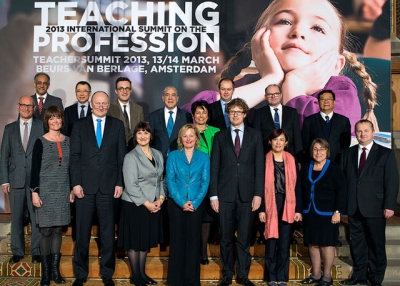Early Teacher Development

A global trend in education reform is focused on the recruitment and training of new teachers. Earlier today, Asia Society released a report, Early Teacher Development, to explore how school systems around the world recruit and train pre-service teachers. One of the report's authors, Edmund Misson, shares his findings.
By Edmund Misson
Watching a great teacher at work is an experience that leaves you wondering how they do it, and how it all seems so effortless. It is difficult to remember at these times that every great teacher was once a novice, and before that a student beginning the journey of learning how to teach.
And it is sometimes hard not to wonder whether other potentially great teachers were discouraged and left the profession before they fulfilled their potential.
Education policy increasingly focuses on attracting the best people into teaching and providing them with a strong foundation for a successful teaching career.
Asia Society's Global Cities Education Network has recently been discussing how the world's best education systems approach the initial teacher education and induction of new teachers. To inform this discussion, Asia Society commissioned the Australian Institute for Teaching and School Leadership to develop a paper summarising the evidence and best practice on initial teacher education and induction.
Teaching is an unusual profession in that new teachers are expected to take full responsibility for their students from day one. In a traditional model of schooling, with one teacher in each classroom, with the door shut, this can be an isolating sink-or-swim experience. Improving initial teacher education, induction, and the links between the two, offers the promise of a more supported and more effective transition. If we get this right, we can reduce the attrition of new teachers and set more of them up for successful teaching careers.
In initial teacher education, the overall trend is towards greater integration of theory and practice. In some countries this is referred to as a clinical model. The great challenge for this approach is to bring together the school-based and university-based components of a program into a coherent whole that prepares new teachers for the schools in which they will teach. We have identified four success factors:
- A clear vision for effective teaching so that all parts of the program are united by a common view of what graduates should know and be able to do.
- Integrating theory and practice so that graduates understand a range of teaching approaches and are skilled in implementing them.
- Highly skilled and well supported supervising teachers who are able to contribute to pre-service teachers' learning on school placements.
- Sustainable, scalable partnerships so that the benefits of close collaboration between schools, education systems, and universities can become widespread.
One advantage of making school experience central to initial teacher education should be a smooth transition into employment. However, this transition has a much greater chance of success when new teachers enter schools that have supportive cultures focused on the learning and development of all teachers. Four success factors for induction in schools are:
- Structured mentoring by skilled mentors is the most common induction process used internationally and ensures all new teachers get support.
- A culture of observation, collaboration, and feedback new teachers' learning and growth will be best supported in a school where the conditions exist for all teachers to develop throughout their careers.
- Continuity with initial teacher education so that what teachers learn in their first years in school builds on what they already know.
- Resourcing and implementation so that induction policies, which most education systems have in place, are effectively implemented at the school level.
Improving initial teacher education and induction are vital to teacher quality. However, further benefits can be gained by ensuring continuity between these two career stages. This avoids the situation where teachers entering a school feel pressure to unlearn what they have learned in initial teacher education before they can feel like they belong in their new school.
Education systems around the world have different approaches to ensuring this continuity. In Australia's devolved and diverse system, a national set of teacher standards articulate what teachers should know and be able to do on graduation from initial teacher education, and on achieving full teacher registration, in a common language.
In a very coherent system like Singapore's, continuity is achieved through close partnerships between the National Institute of Education, which is the sole provider of initial teacher education, the Ministry of Education, and individual schools.
In many US cities, teacher residency programs provide intensive in-school experience during initial teacher education, so that induction is effectively happening at the same time. Although they respond to very different local contexts, all these approaches provide structures that allow better connections and smoother transitions through the vital early years of a teaching career.
However, these structures will only have an effect if schools, universities, and education systems develop strong local partnerships to support early career teachers.
This is the challenge posed by this research. It is possible to identify common features of successful approaches, but the hard work of implementation still needs to happen at the local level taking into account national and local contexts. Everyone involved in education needs to think about how these principles can be effective in your school or system.
Download the full report: Early Teacher Development.







